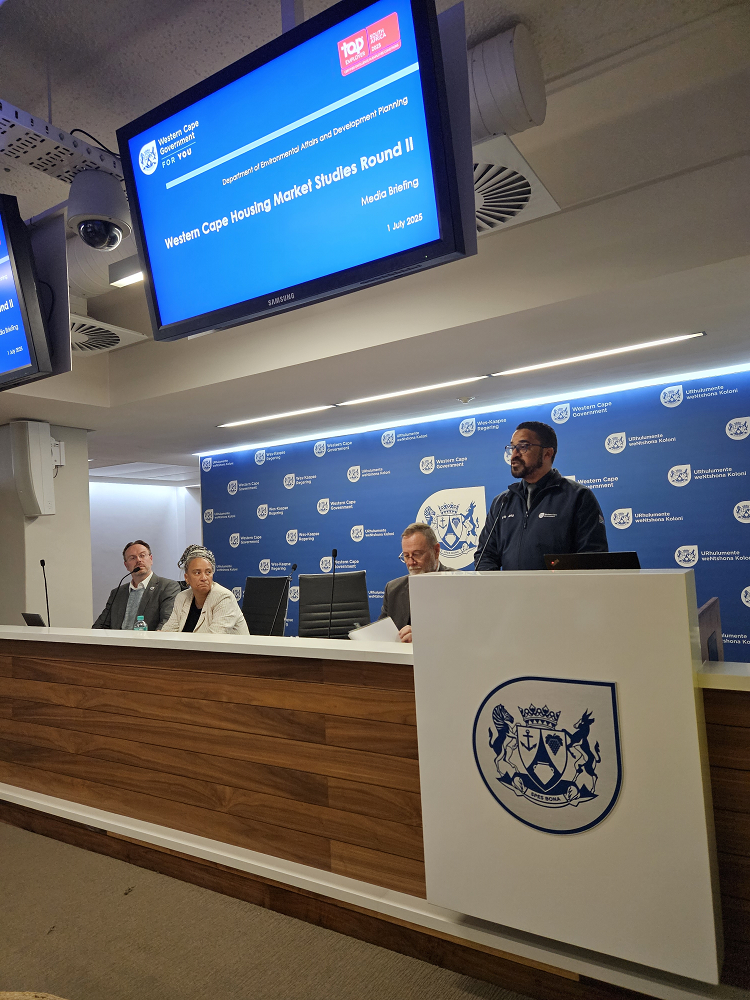Western Cape Government completes Housing Market Studies for seven municipalities as part of the Housing Market Studies Round II project
Joint Media Release
The Western Cape Department of Environmental Affairs and Development Planning (DEA&DP), in partnership with the Department of Infrastructure (DoI), has successfully completed the second round of Housing Market Studies across seven municipalities.
“This initiative is part of the Western Cape Government’s ongoing efforts to deepen its understanding of the local housing market dynamics in the Western Cape, with the aim of advancing well-located, affordable housing opportunities and supporting the development of Municipal Inclusionary Housing Policies where appropriate,” Anton Bredell, Western Cape Minister for Local Government, Environmental Affairs and Development Planning said.
The municipalities included in this latest phase are Swartland, Saldanha Bay, Overstrand, Breede Valley, Bitou, Knysna, and Oudtshoorn. These studies provide critical insight into how local housing markets function, highlighting trends in supply and demand, affordability challenges, and opportunities for both private and public sector investment.
The Housing Market Studies build on the first round of research completed for Drakenstein, Stellenbosch, George, and Mossel Bay. Based on this work, the Stellenbosch municipality has developed and begun implementing its own Inclusionary Zoning Policy in targeted areas where the municipality aims to increase the supply of affordable, well located housing opportunities.
The second round of Housing Market Studies has revealed several common challenges across the municipalities, reinforcing the need for targeted, evidence-based interventions to improve housing affordability and overall market functionality:
Widespread affordability constraints are limiting access to formal housing, particularly for lower-income households. In these segments, the demand for housing far exceeds housing supply, mainly due to affordability challenges.
There is a substantial undersupply of entry-level (up to R300,000) and affordable (R300,000 – R600,000) housing, with limited formal housing available for households who can afford or qualify within this this price range.
The Conventional Housing Market segment (R600,000 to R900,000) also faces notable shortages, with the number of potential buyers or households far exceeding available housing stock.
In contrast, the high-end (R900,000 to R1,2million) and luxury (R1.2million+) housing market segments are generally well supplied, with a higher share of both existing stock and new market-driven development activity.
These imbalances – marked by an undersupply in the lower and middle housing market segments alongside a concentration of supply in the upper-end - contribute to increased growth of informal housing and backyard dwellings, as households unable to access formal housing are forced to seek alternative shelter.
It is also worth noting that the studies primarily reflect trends within the formal housing market. As such, informal settlements, backyard dwellings, and subsidised units without title deeds, are underrepresented. This suggests that the true scale of housing need, especially among the lowest income groups, is likely even greater than reflected in the data.
The Western Cape Minster of Infrastructure, Tertuis Simmers, said, “These studies are pivotal in giving us the intelligence to invest smarter, plan better, and partner more effectively to deliver affordable housing where it’s needed most. The housing crisis is not just about quantity, it’s about access, location, and dignity, and this data helps us respond in ways that are practical, targeted and inclusive.”
“The insights from the housing market studies will assist municipalities to develop appropriate responses to housing affordability challenges. This may include developing an Inclusionary Housing Policy, Affordable Housing Strategy, refining the Municipal Spatial Development Framework, Integrated Development Plan, and Human Settlements Plan, while also exploring innovative approaches beyond traditional state-subsidised housing delivery that enable the delivery of affordable housing, Minister Bredell said.
The final phase of the Housing Market Studies Round II project, scheduled for 2025/26, will revisit and update the original four municipal studies that were undertaken in Round I. It will also include a knowledge-sharing workshop and the publication of a consolidated comparative report. This report will identify key trends, highlight regional differences, and outline strategic interventions to enhance housing market performance across the province.
Audio
Media Enquiries
Wouter Kriel
Spokesperson for Minister Anton Bredell
Western Cape Minister of Local Government, Environmental Affairs and Development Planning
Cell: 079 694 3085
Email: Wouter.kriel@westerncape.gov.za
Melt Botes
Spokesperson for Provincial Minister Tertuis Simmers
Tel: 021 483 8067
Cell: 082 431 0068
Email: Melchior.Botes@westerncape.gov.za


